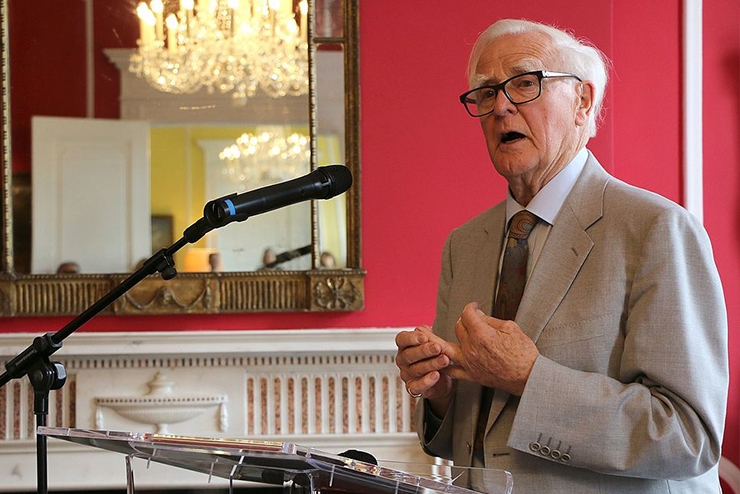The man whose books redefined the spy novel genre, David John Moore Cornwell, died of pneumonia on December 12 at the age of 89. Author of such intricately woven yarns as Tinker Tailor Soldier Spy, The Honourable Schoolboy, and Smiley’s People, Cornwell was better known by his nom de plume John le Carré, and often dealt with the timeless issues of loyalty and betrayal, passion and death in his writing.
Le Carré created George Smiley, a lonely, complex, and tormented intelligence analyst, the antitype of the flamboyant James Bond. Masterfully portrayed on screen by Sir Alec Guinness, Smiley is prone to “academic excursions into the mystery of human behavior, disciplined by the practical application of his own deductions.” Smiley’s worthy opponent is a Soviet spymaster called “Karla.”
Le Carré’s spy novels were the result of firsthand espionage knowledge, as le Carré worked both for the Security Service (MI5) in London, and for the Secret Intelligence Service (MI6, aka “the Circus”) while posted as a diplomat in Germany at the height of the Cold War. “I have such conflicting memories of my former service—actually of both services—and such conflicting emotions, that I am perpetually at a loss to know what I really think,” he once told a BBC journalist.
Firsthand knowledge of betrayal also influenced his novels, as his mother abandoned him when he was five. He did not see her again until he turned 21. Meanwhile, le Carré’s relationship with his father, whom he portrayed in his 1986 novel The Perfect Spy, was difficult. “Ronnie” Cornwell was a charming but reckless confidence trickster, always in debt and living on the fringes of the law. Once jailed for insurance fraud, he was an associate of the notorious Kray twins, London’s high-profile criminals in the 1950s. “Almost everything he did had a conspiratorial side to it,” le Carré recalled years later. “There is a correlation, I suppose, between the secret life of my father and the secret life I entered at a formative age.”
That secret life ended abruptly in 1964, when le Carré’s cover was blown by Kim Philby after the latter’s defection to Moscow. Le Carré turned to writing, acquiring fame and riches with his first bestseller, The Spy Who Came in from the Cold. This early masterpiece presented the reader with issues of moral ambivalence, human fallibility, and a deeply tragic sense of life, most unusual for a “spy novel.” It leaves us with the uncomfortable realization that espionage, the second-oldest profession, shares some basics with the oldest: deception and duplicity. Both call for similar talents, and top spies, like expensive prostitutes, may enjoy the aura of glamour tinged with danger. In certain temperamental types, espionage evokes a somewhat perverse excitement, but le Carré knew that there was nothing particularly noble or honorable about the craft.
Le Carré was a quintessentially English writer whose early career coincided with the discovery of very real Soviet agents groomed at Cambridge, holding senior posts in the diplomatic service and even in the arts establishment. As Rebecca West noted in The New Meaning of Treason, during World War II various Nazi collaborators, such as William Joyce (“Lord Haw-Haw”), were open enemies of Western democracy.
Communist traitors, by contrast, were sustained by self-hatred masquerading as Marxist ideology. In Britain they enjoyed a field day from the late 1930s on, leaving a putrid trail that spanned four decades. Their elevated milieu and privileged status—as seen in Anthony Blunt, one of the “Cambridge Five” Soviet spies—coupled with their access to strategic information and personnel (Philby), made them doubly dangerous.
Le Carré’s characters hint that the inherently corrupt nature of the game itself served as a self-justifying microcosm of the society at large: manipulative, materialistic, sterile. “I’ve always had a frightful contempt for the self-indulgent dilemmas of affluent Western man,” he once said, “compared to the experiences of real hell, of people who spent twenty years in jail for almost immaterial reasons.” Many of his characters dwell in a hell of their own making, a world marked by deceit, weariness, and despair.
Reviewing le Carré’s novel, A Perfect Spy, the late English novelist Anthony Burgess wrote that “le Carré’s talents cry out to be employed in the creation of a real novel.” This was the haughty voice of High Culture rejecting the notion that the spy novel could ever be “literature,” and it was plain wrong. Just like Charles Dickens did with the serial publication of penny novels in the 1840s, John le Carré succeeded in turning a popular form into high art.
Image Credit:
Wikimedia Commons-German Embassy London, CC BY 2.0

Leave a Reply